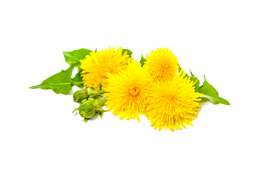
Caboodle
Definition: all of a group of things
So, you’ve gone and got yourself a kit. Very nice, very nice. Looks like a sewing kit, or maybe a first aid kit. Okay, now we see it’s a model airplane kit. Congratulations. But do you have the caboodle that, we presume from the phrase “whole kit and caboodle,” goes with it? Seems pretty important, so what exactly is a caboodle?
Caboodle does not refer to anything specific, but rather, everything unspecific—that is, all of the things that make up a group or collection. It’s often used in the phrase “whole kit and caboodle” for extra emphasis, but sometimes “the whole caboodle” or even just “caboodle” may appear in the wild. And speaking of extra emphasis, caboodle is the result of adding the intensive prefix ca- to boodle, which comes from the Dutch word boedel, meaning “estate” or “lot.”
Jasper: You couldn’t get half a dozen coats out of the whole caboodle.
Sergeant Tibbs: Coats! Dog-skin coats?
Cruella de Vil: Then, we’ll settle for half a dozen!
— 101 Dalmatians, 1961
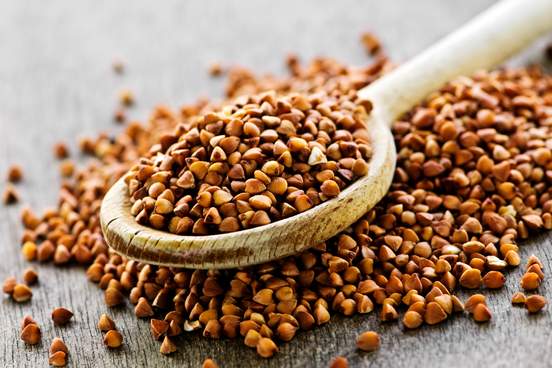
Buckwheat
Definition: the edible seeds of either of two Eurasian herbs of the genus Fagopyrum used as a cereal grain
Wheat has been baked into the English language for a long, long time, going back all the way to the Old English word hwǣte, well before the 12th century. Buckwheat didn’t appear until the mid-16th century, and while it shares ancient Germanic roots with wheat, is a borrowing of the Dutch word boekweit. Boekweit in turn combines the Dutch word for wheat, weit, with a word that shares roots with the Old High German word buohha, meaning “beech tree.” Buckwheat is unrelated to wheat or beech trees, but as it can be used much the same as wheat and has large seeds that resembles beech nuts, the name makes sense.
Buckwheat contains significantly more protein, fiber, and B vitamins than wheat or oats. One of buckwheat’s most distinguishing features is its dark color, which comes from the rutin in its husks.
— Roxana Jullapat, Mother Grains: Recipes for the Grain Revolution (2021)
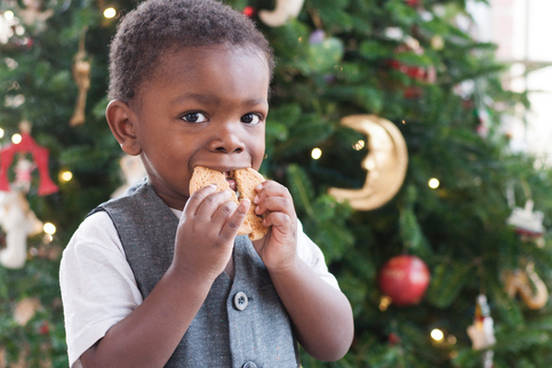
Cookie
Definition: a small flat or slightly raised cake
The Dutch, exhibiting a fine degree of linguistic munificence, were kind enough to give us the word cookie (it comes from their word koekje, which is the diminutive of koek, meaning “cake”). And, ingrates that we are, the English–speaking people have taken the humble cookie and used it in all manner of unfortunate ways. We have the adjective cookie-cutter (“marked by lack of originality or distinction”), the noun cookie pusher (“a vacuous person without force who is given to an active but innocuous social life”), and phrases such as toss one’s cookies (“to eject the contents of one’s stomach”). Cookie has a considerable range of additional meanings in English, from describing a person (such as a tough cookie) to computer files that store personal information of users on the Internet.
There is a variety of desserts: his fruit salad, some pecan pie, pumpkin pie, a cherry tart, lemon squares, snickerdoodles, a host of cookies. He eats them bit by bit, inch by inch, sliding them into his mouth. He is the only one eating because everyone else is speaking quietly, in twos and threes, trying to unravel what has happened.
— Brandon Taylor, Real Life: A Novel (2021)

Caboose
Definition: a freight-train car attached usually to the rear mainly for the use of the train crew
Caboose is thought to have entered English from the Dutch word kabuis (also kombuis) in the early 1700s, and in its earliest use it referred to a ship’s galley, or kitchen. But perhaps unbeknownst to its first users, caboose had a lot more junk in its trunk, so to speak. In the intervening centuries it has been used for everything from an open-air cooking oven to a hut. In the late 1800s it was adopted into the lingo of a new mode of transportation as a name for a small freight-train car attached usually to the end of a train, which led to its use for anything that follows or is last in line. Bringing up the rear is the now-familiar sense of “buttocks.”
They scrambled from the cab, bellies to the ladder, free-sliding down the grab rails. From the caboose, twenty cars back, the conductor and a brakeman came running—two bouncing dots in the distance, shouting, “What happened?”
— Lavyrle Spencer, Then Came Heaven (Berkley, 2005)

Knapsack
Definition: a bag (as of canvas or nylon) strapped on the back and used for carrying supplies or personal belongings
The humble and useful knapsack gets its name from the English language’s Germanic relatives: it’s either from Low German knappsack or Dutch knapzak. The second syllable in each of those translates unremarkably to English sack. But each word’s first syllable comes from knappen, a word that in both languages means “to make a snapping noise” or “eat.” There is, however, no confirmation that the first knapsacks snapped or ate.
Most of the time she had both seats to herself. Space to spread out. Sleep. Read back issues of Ramparts rolled in her knapsack.
— Toni Morrison, Paradise (1997)
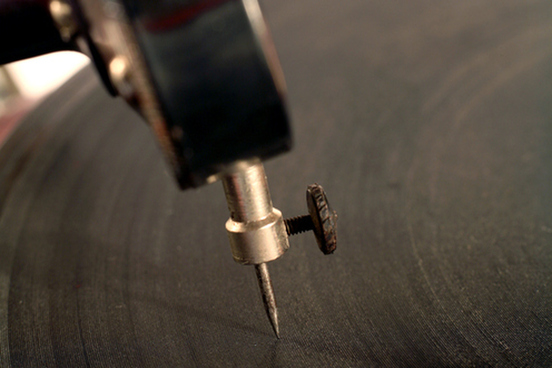
Groove
Definition: a long narrow channel or depression
Groove had enjoyed such a notable degree of success in various colloquial and non-standard forms of English that one might be forgiven for assuming that it comes from the province of slang. After all, it has served as the basis for groovy, may be used in reference to one of several kinds of popular music, and may also serve as a way of indicating that something is performed in admirable fashion (“he was really in the groove”). However, the word had the initial meaning in Middle English of “pit” or “cave,” and came from the Middle Dutch word groeve.
I remembered first encountering Thriller in Puerto Rico in 1982…. I didn’t have a record player there so I just spent a month studying the Thriller disc and wondering why “Human Nature” had all these weird ridges in the groove—the shaker parts.
— Ahmir “Questlove” Thompson and Ben Greenman, Mo’ Meta Blues: The World According to Questlove (2013)

Wiseacre
Definition: one who pretends to knowledge or cleverness; especially, smart aleck
Wiseacre has the look and sound of a fairly recent word. After all, similar words, such as wisecracker and wisenheimer appear to have little or no evidence of use prior to the 20th century. However, the word has been in use since the 16th century. It does not come directly from wise; wiseacre is from the Middle Dutch word for “soothsayer” (wijssegger).
We let others confirm what we already know, and we get mad because they say it; what appears like revelation is the calling of a desperate bluff: the young wiseacre who, starting his story, says, “This feller was really old, about fifty or sixty—” drives every listener of fifty up the wall.
— Paul Theroux, Saint Jack (1973)

Hustle
Definition: to obtain by energetic activity
Hustle, which comes from the Dutch word husselen (“to shake”) nicely illustrates how a single word may encompass multiple shades of meaning, and, based on the context in which it is used, generally will be correctly interpreted. After all, when a high school basketball coach exhorts players to “go out there and hustle” it is widely understood that the meaning is “go play with enthusiasm and verve,” and not “go engage in fraud and deception,” or one of the word’s other meanings.
I’d met kids who lived on the streets and in parks and talked about the times when they lived where it was warm, how it was paradise, to hustle and not pay rent and figure food out however you could, a real adventure.
— Tommy Orange, Wandering: A Novel (2024)

Kink
Definition: a short tight twist or curl caused by a doubling or winding of something upon itself
Kink is the exception to that old saying that ‘words with a K in them are funny.’ Despite having an abundance of these letters kink appears to not be funny at all. It comes from the Dutch word of the same spelling, meaning “a twist or twirl,” which is nearly the exact same meaning it initially had in English. The sexualized sense of kink is one of its more recently acquired meanings, and does not appear in print prior to the mid-twentieth century.
It’s wrong to think that Black hair is such a popular topic because it’s a painful one. We have always believed that even though Black people might have a lot of convoluted feelings about their hair, and non-Black people might be confused when confronted with our kinks and curls, there is also a lot of beauty and pride in the subject.
— Ayana D. Byrd and Lori L. Tharps, Hair Story: Untangling the Roots of Black Hair in America (2014)
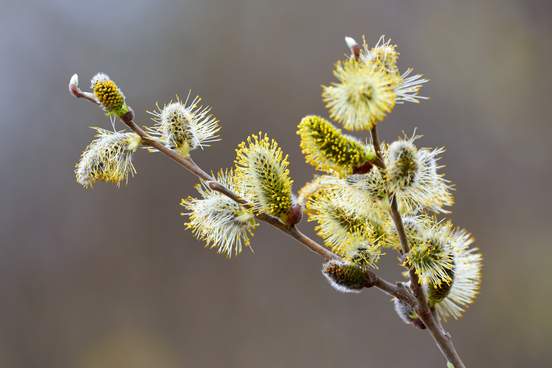
Catkin
Definition: a spike-shaped cluster of flowers (as of the willow, birch, or oak)
A catkin is an elongated, pendulous spike of trees, such as the willow or the birch, that has small flowers that grow directly from the stem. Its name, which comes from the Dutch katteken, originates from its soft, furry appearance, like that of a cat’s tail. Another name for the catkin is ament, which is from amentum, a Latin word for a thong or strap.
“Nature’s first green is gold,” Robert Frost wrote, “her hardest hue to hold.” Even as a schoolgirl, I understood the paradox of those lines—of green beginning in gold, of leaf beginning in flower—but I had never seen that paradox for myself. … But every year the sugar maples in my Tennessee yard flower in pale catkins, clusters of miniature flowers descending from long filaments.
— Margaret Renkl, The Comfort of Crows: A Backyard Year (2023)
